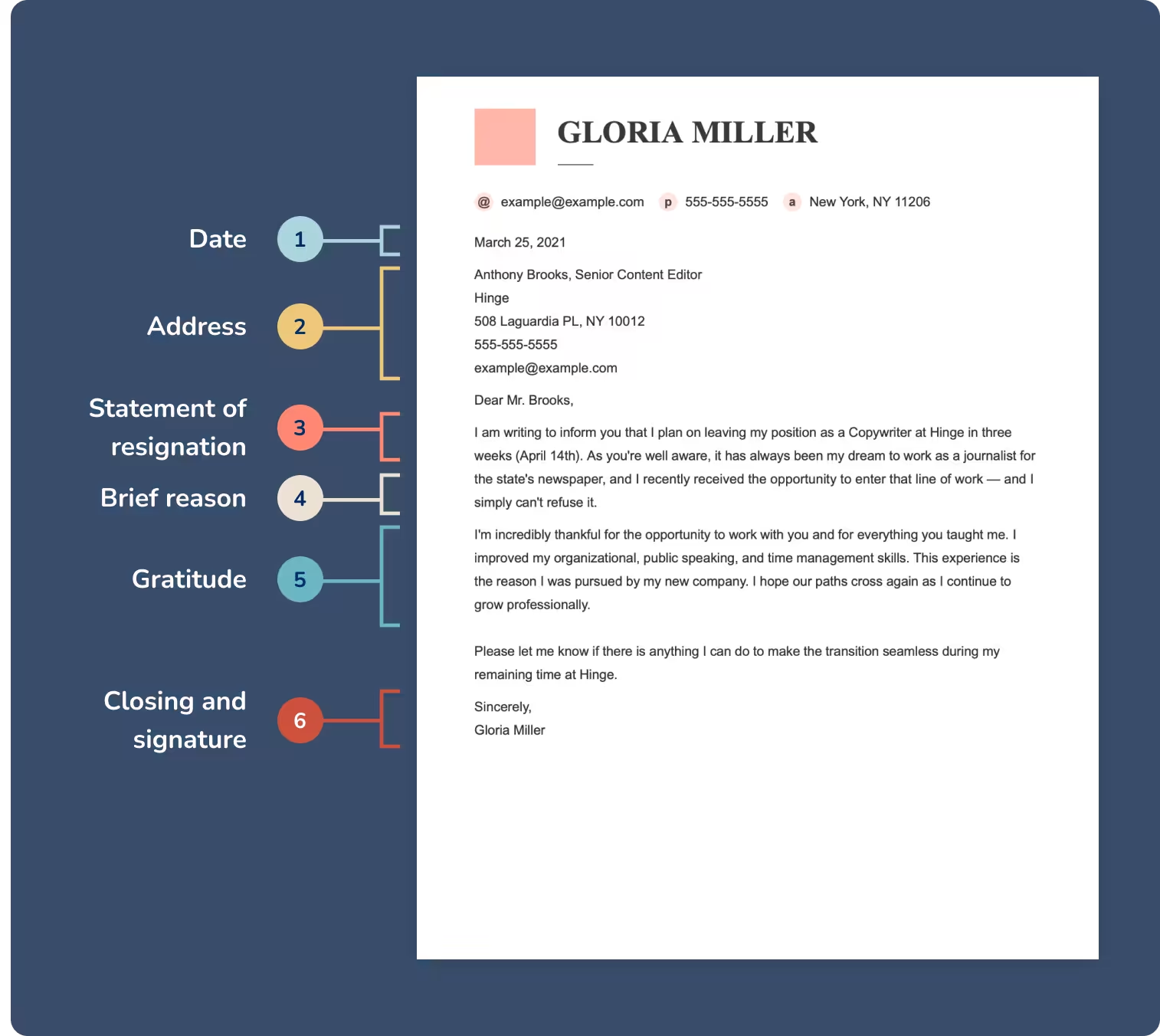Our customers have been hired at: *Foot Note
Resignation is an inevitable part of your career development journey. While moving on from a job that no longer serves you is necessary and exciting, it can also feel uncomfortable, and the dreaded resignation letter only makes matters worse.
This is where we come in. We’re here to help with professionally-written example resignation letters, guidance, and templates to help you navigate your career transition.
Example resignation letters:
In this guide, we'll cover what to include in a resignation letter (and what not to include). We'll also provide step-by-step guidance on how to make a resignation letter with professionally made resignation letter examples and templates.
What is a resignation letter?
A resignation letter is a formal document sent by an employee to their employer notifying them that they will no longer be working at the company. The letter establishes an official record of notice with essential details such as the employee’s last day.
Typically, a resignation letter is preceded by an in-person conversation between the employee and their employer discussing the intent to resign.
Resignation letters are an important element of the employee-employer relationship and can help maintain positive and professional correspondence between the two parties. The content of your resignation letter might vary depending on your unique situation.
What to include in a resignation letter
A professional letter of resignation is a formal document that serves as evidence of an employee's decision to leave their position.
Express gratitude, maintain a positive and professional tone and avoid any negative comments or criticism of the company or your colleagues.
Below is a sample letter of resignation that shows what to include in each section of your document.
Resignation letter sample
Your resignation letter should be straightforward and professional. Below are the sections that comprise a resignation letter and what you should include in each.
- Date the letter is being submitted and your contact information.
- Address the person you’re giving the letter to formally.
- State that you’re resigning from the position in the company with your last date of employment.
- Briefly explain why you’re resigning.
- Thank the employer for the opportunity to work for them.
- Finish the letter with your signature.
By maintaining a respectful and professional tone in your resignation letter, you can preserve your relationship with the company and leave on a positive note.
This can be helpful in the future if you need a reference or want to return to the company in a different role.
What not to include in a resignation letter
How you leave a job is arguably just as important as how you start one. While it can be tempting to share every detail of your departure in your resignation letter, it’s best to stick with the essential information.
53% of HR managers said in a survey that how an employee quits a job can affect their future career opportunities.
Here’s what not to include in your resignation letter:
- Specific details about why you are leaving the company.
- Unnecessary information about your new job.
- Complaints about your employer or your time at the company.
- Negative comments about your colleagues.
- Unprofessional or emotional language.
When should you send a letter of resignation?
In general, it is recommended to provide at least two weeks' notice before the last day of work, although this may vary depending on the terms of employment or the nature of the job. It is important to check your employment contract or company policies to determine the required notice period.
Try to notify your employer of your resignation as soon as possible in order to provide them with adequate notice. You can hand in your official resignation letter when you meet with your employer or the following day once you’ve had the chance to finalize everything.
If you work remotely and notify your employer on a video call, attach your official resignation letter as a PDF or Word document in a formal email and send it to them within 24 hours of your initial call.
It’s always a good idea to write a resignation letter when you resign, even if it isn't officially required by your employer. Writing a resignation letter helps maintain a positive relationship with your employer which can come in handy if you need a professional reference in the future.
Are resignation letters required?
Although some companies don’t officially require a formal letter of resignation, it is highly recommended that you send one anyway. You can check your employee handbook to determine the protocol for your place of work.
Here are some reasons you should send a resignation letter when you leave a job:
- Provides important details such as your last day so that employers can prepare accordingly for your departure.
- Functions as an official record that can be referenced to keep track of when you informed your employer of your departure and the date of your last work day.
- Maintains a positive relationship between you and your employer, which can come in handy if you need a professional reference in the future.
- While it can be tempting to share every detail of your departure in your resignation letter, it’s best to stick with the essential information detailed above.
A resignation letter does more than just formalize your departure from the company. It’s also a professional courtesy that helps you maintain your reputation, exit your job gracefully and transition smoothly into your next role.
Whether or not you like your employer, the bottom line is that handing in a well-crafted resignation letter speaks volumes about your professionalism.
How to write a resignation letter
No need to spend hours researching how to write a letter of resignation. Instead, follow the steps below to craft a professional and polished resignation letter in a matter of minutes.
State your intent to resign and your last date of employment
Oftentimes, deciphering how to start a resignation letter can be the trickiest part of the process. Start your letter by writing your statement of resignation from the position in the company.
After this, provide the date of your last day of employment. Take a look at the short resignation letter introduction below to get started:
“Dear Mr. Jones,
I am writing to inform you of my resignation as a Bank Teller at JOY Bank, effective September 15th.”
Briefly detail your reason for resigning
If appropriate, give a brief reason for why you’re leaving. You don’t have to go into detail about where you’re going or what you’ll be doing in your next place of employment; a simple explanation will do. For example:
“I was given a job offer that I simply cannot refuse and must vacate my position.”
Express your gratitude
It’s important to resign gracefully, even if your time working for the employer was less than great. Thank them for the opportunity to have been part of their team and maintain a positive attitude. For example:
“Thank you for making me a part of your team. These four years have brought incredible professional and personal growth.”
Share your willingness to help with the transition
After thanking them, offer to help during the transition period, if feasible. Perhaps your manager will turn down the offer and assure you they’ll handle everything, but they’ll appreciate the gesture. It’s as simple as writing:
“Please let me know if I can be of any help to make this transition seamless during my remaining time at JOY Bank.”
Now that you know how to end a resignation letter, complete the document with your signature. If it’s convenient, print a hard copy, sign it and give it to your manager, but emailing a PDF version of your resignation letter with an electronic signature will work if you are remote or unable to meet up.
Free resignation letter template
Writing a resignation letter can be tricky, so we’ve put together this resignation letter sample template to help you get started.
Your Name
Your Address
Your Phone Number
Your Email
Today’s Date
Employer’s Name
Employer’s Title
Company Name
Company Address
Dear [Employer’s Name],
I am writing to announce my resignation as the [position] at [company name], effective [date of last day].
This was not an easy decision to make. [Company name] opened many doors for me and the past three years have been an incredible learning experience. Thank you for the opportunity.
If I can be of any help during the transition, please let me know.
Sincerely,
[Your Name]
If you don’t have a new job lined up, it’s essential to write an effective resume that highlights your unique skills and experiences.
Our Resume Builder is a great tool for crafting a standout resume that’s sure to land you an interview. Browse our library of resume templates and resume examples to get inspired.
Make a resume with MyPerfectResume
Our Resume builder can help you write the perfect resume. Start Now!
Resignation letter examples
Below you’ll find several scenarios or reasons for which you may decide to resign. Find the one that applies to you and use it as a base to create your resignation letter.
Simple letter of resignation examples
These are general resignation letters that you can use for many circumstances. They keep it simple and straight to the point.
Two Weeks’ Notice resignation letter
Basic resignation letter
Simple resignation letter
Short-notice resignation letter examples
Most employers expect a two weeks’ notice when you resign. However, in some situations, you will need to write a short notice or immediate resignation letter. It is important to remain gracious and professional in a resignation letter effective immediately, regardless of the circumstances. Reference the examples below for guidance.
Better opportunity example letters of resignation
Maybe you got a fantastic job offer that you can’t refuse, or perhaps you think that something better awaits. Either way, you’re ready to take the leap, and these examples will help you get started.
Dream job offer resignation letter
New job opportunity resignation letter
Lack of growth opportunity
Family matters or medical resignation letter examples
Unexpected situations and big life changes, like health issues, family situations and childbirth, can be why you may feel it’s necessary to resign. If you cannot give a two weeks’ notice, we recommend referring back to our effective immediately resignation letter samples.
Health reasons resignation letter
Pregnancy resignation letter
Family reasons
Temporary or part-time job resignation letter examples
There are times when you know that turning a temporary or part-time job into something permanent isn’t something you want to do — and other times, a new opportunity comes along that you have to accept.
Internship resignation letter
Part-time job resignation letter
How to hand in your resignation letter
When it comes to handing in a resignation letter, it's important to be professional and respectful in order to maintain a positive relationship with your employer.
How to tell your boss that you are resigning
Generally, you should give your employer two weeks’ notice before quitting. This allows both of you the necessary time to plan for a smooth transition. This should be done in person whenever possible. If you work remotely, schedule a time to meet via video call.
However, if you are certain that you are leaving for a new job, an upcoming move or another reason, you can bring your resignation letter with you when you meet with your manager and hand it to following your verbal discussion.
If you hand in your letter during the meeting, follow up later that day with a thank you email thanking your employer for the opportunity to work with them and expressing your appreciation for their support.
Is it acceptable to send a resignation letter by email?
It is best to notify your manager of your resignation in person (or by video call if you work remotely). If you do not hand your resignation letter to your manager during this initial meeting, it is perfectly acceptable to email the letter to them afterward.
Within 24 hours of meeting with your manager, send your official resignation letter via email. Download your letter as a PDF or Word document and attach it to the email rather than writing it directly in the body of the email.
In the body of the email, you can briefly address your employer and any additional recipients, thanking them for their guidance throughout your time at the company and notifying them that you attached your official letter of resignation.
Who should you send your resignation letter to?
When you resign from a job, it is important to send your resignation letter to your immediate supervisor or manager. If there is an HR department in your company, you should also send a copy of your resignation letter to the HR department.
In some cases, there may be additional individuals that you should notify of your resignation, such as a CEO or other members of the executive team. This will depend on the structure of your company and your position within it.
Sending your resignation letter to the appropriate individuals ensures that your resignation is properly documented and that the necessary steps can be taken to transition your responsibilities to someone else.
The impact of resignation on your career trajectory
The impact of resignation on your career trajectory can vary depending on the circumstances and how you go about resigning.
How can resigning positively impact your career prospects?
If you take the necessary steps to exit gracefully, resignation can positively impact your career trajectory. Positive effects of resigning from a job can include:
- Pursuing a better opportunity: Resigning to take on a new job that offers better pay, benefits or career advancement opportunities can help to improve your career trajectory.
- Improving work-life balance: Resigning to achieve a better work-life balance, such as spending more time with family or pursuing personal interests, can lead to a happier and more fulfilling personal life, which can have a positive impact on career trajectory.
- Removing a negative work environment: Resigning to remove yourself from a negative work environment can help to improve mental health and well-being, which can in turn have a positive impact on your career trajectory.
If you leave a job on good terms — with proper notice and a clear reason for leaving — it is unlikely to have a negative impact on your future job prospects.
Check out this networking advice for actionable tips on how to connect with professionals in your field.
Can resigning negatively impact your future job prospects?
If you leave a job without proper notice, in a confrontational manner or because of poor performance, it may have a negative impact on your future job prospects. Employers may view such behavior as unprofessional and be hesitant to recommend you in the future.
It is important to handle your resignation with professionalism and respect, regardless of the circumstances. This includes giving proper notice, offering to help with the transition and thanking your employer and colleagues for the opportunity to work with them.
Ultimately, if you handle your resignation with professionalism and respect, it is unlikely to have a negative impact.
How to discuss resignation during a job interview
Explaining your reasons for leaving a past role during a job interview is an important part of the hiring process. Here are some tips on how to do it effectively:
- Focus on the positive: Instead of dwelling on the negative aspects of your previous job, focus on what you learned from it and how you will apply these skills in your new role.
- Keep it professional: It's important to maintain a professional demeanor when discussing your reasons for leaving a job. Avoid speaking negatively about your previous employer and instead focus on the reasons why the new opportunity is a better fit for you.
- Be concise: Keep your explanation brief and to the point. You don't need to go into great detail about your reasons for leaving, but you should provide enough information to satisfy the interviewer's curiosity.
By being honest, focusing on the positive and maintaining a professional demeanor, you can effectively communicate your reasons for leaving and make a strong impression on the interviewer.
Key takeaways
- A resignation letter is a formal document that informs your employer of your departure.
- It's important to send a professional resignation letter to maintain a positive employee-employer relationship.
- Your resignation letter should be short and sweet and should not include any negative comments.
- You can use resignation letter examples to help craft your resignation letter according to the circumstances of your departure.
- After notifying your employer face-to-face that you are resigning, you can hand in your resignation letter in person or attach it to a professional email.
- When you take the necessary steps to exit gracefully, resignation can positively impact your career trajectory.
FAQ
How do you write a formal resignation letter?
A formal resignation letter should state your intention to resign, your last day of work and your gratitude towards your employer. Refer to examples of resignation letters for inspiration on what to include in your formal letter.
Prior to sending a formal letter, it’s a good idea to have a face-to-face conversation with your employer (or a video call if you work remotely).
This prevents the risk of catching your employer off guard if they receive a formal letter in their email inbox before having a verbal discussion with you.
How do I write a short resignation letter?
To keep your resignation letter short and to the point, avoid including unnecessary information. You do not need to disclose the reason for your departure or where you are going next.
Additionally, while it’s important to thank your employer, you don’t need to go into too much detail regarding their impact on your career. Oversharing can end up sounding disingenuous and making your letter much longer than needed.
Offer to help with the transition by training your replacement or assisting with the handover of your responsibilities. This will show that you are committed to ensuring a smooth transition and maintaining a positive relationship with your employer and colleagues.
How do you address a resignation letter to multiple recipients?
If there are multiple people you need to send your letter of resignation to, you should still address the letter to one person only.
To get it to additional recipients, you can simply copy them on the email you send to your manager with your letter attached.
You can address the additional recipients in the email body, thanking them for their support throughout your time at the company.
Do you have to give a two weeks' notice?
Although there are no laws requiring employees to give a two weeks’ notice before quitting, it is best practice to do so in order to maintain a positive relationship with your employer.
However, there are plenty of circumstances when this might not be possible, in which case you should notify your employer of your departure as soon as possible and offer to help in any way that you can before leaving.
Do you send a resignation letter to HR or your manager?
It depends on the structure of your company, but typically you will send a copy of your resignation letter to the HR representative and to your direct supervisor. Read your employee handbook to determine the correct protocol for your company.
How do you tell your boss you’re quitting?
Informing your boss of your resignation can certainly be nerve-wracking. It’s important to go into the conversation with a clear idea of what you will say to avoid burning bridges.
A face-to-face conversation is in order before you send your official resignation letter. Be polite and express your gratitude in the most genuine manner possible.
As you journey into the next stages of your career, consider these four skills hiring managers want in job hunters but can’t often find.
When should you resign from a job?
Maybe your first professional job wasn’t what you expected (for future reference, here are five things to expect from your first job). Or maybe you no longer feel challenged and fulfilled by your day-to-day tasks.
Ultimately, the decision to leave your job boils down to whether you feel the position is moving you toward your professional goals.
If you decide it’s time to move on, you can always refer back to this guide to craft the perfect resignation letter that maintains a positive relationship between you and your employer.
Explore our guide on the top high-income skills to learn to open up new career opportunities and maximize your earning potential. We also recommend checking out current RTO trends for insight into the future of workplace expectations.
How do you address a resignation letter?
When addressing a resignation letter, you should use a professional and formal tone. Here’s how to address your resignation letter:
- Start with the date: At the top left corner of the page, write the date you’re submitting the letter.
- Add the employer’s contact information: Below the date, write the employer’s name, job title and company name, followed by the company’s address.
- Add your contact information: Below the employer’s contact information, write your name, job title and address.
- Add the salutation: Use a formal greeting, such as “Dear [employer’s name].”
Remember to keep the tone professional and positive throughout the letter, even if you are leaving due to negative circumstances. A resignation letter is a formal document that will be kept on record, so it’s important to leave a good impression.
Should I notify my colleagues about my resignation?
Whether or not you inform your colleagues about your resignation may depend on the specific circumstances and the culture of your workplace. However, it is generally a good idea to inform your colleagues about your resignation before you leave. Here are a few reasons why:
- Maintain positive relationships: Informing your colleagues about your resignation can help to maintain positive relationships, as it shows that you respect and value their contributions to the team.
- Facilitate a smooth transition: Letting your colleagues know about your resignation in advance can help to facilitate a smooth transition, as they will have time to prepare for your departure and make arrangements to cover your workload.
- Provide closure: Sharing your resignation with your colleagues can provide a sense of closure for both you and your colleagues, as it allows you to say goodbye and express your appreciation for their support.
- Networking opportunities: Informing your colleagues about your resignation can also provide networking opportunities, as they may be able to offer recommendations or referrals for future job opportunities.
That being said, it’s important to be tactful and discreet when informing your colleagues about your resignation. You should respect any confidentiality agreements you may have signed and avoid sharing any negative feelings or criticisms about your employer or colleagues.
How should you format a resignation letter?
The best resignation letter format is a professional and formal letter that clearly communicates your intention to resign and expresses gratitude for the opportunity to work with the company.
Here are some tips for formatting a resignation letter:
- Use a standard business letter format: Your resignation letter should be formatted like a standard business letter, with a header, date, salutation, body, closing and signature.
- Use a clear and readable font: Choose a professional font such as Times New Roman or Arial, in a size of 10 to 12 points.
- Use short paragraphs: Make your resignation letter easy to read by using short paragraphs, with one idea per paragraph.
- Highlight important information: Use bold or italic fonts to highlight important information, such as the date of your last day of work.
Remember that your resignation letter is a formal document that will be kept on record, so it’s important to present a professional image. Use our resignation letter template free of charge to start formatting your document.
What is a good subject line for an email resignation letter?
The subject line of an email resignation letter should be clear and concise and should convey the purpose of the email.
Here are a few suggestions for the subject line of your letter of resignation email:
- Notice of Resignation [Your Name] – [Planned Date]
- Resignation Letter – [Your Name]
- Formal Resignation – [Your Name]
- Resignation Effective [Date] – [Your Name]
- Departure Announcement – [Your Name]
- Thank You and Resignation – [Your Name]
- Saying Goodbye – [Your Name]
Choose a subject line that is professional and to the point. Keep in mind that the subject line is the first thing the recipient will see, so it should accurately reflect the content of the email.
Is it better to resign on a Friday or a Monday?
The choice of the day to resign is a personal preference and may depend on individual circumstances.
Some people prefer to resign on a Friday as it allows them to complete their final week of work and say goodbye to their colleagues. Others may prefer to resign on a Monday as it allows them to start a new week with a fresh start.
In general, it is recommended to provide at least two weeks’ notice before the last day of work, regardless of the day of the week. This provides the employer with enough time to make arrangements and ensures a smooth transition of responsibilities.
It is also important to follow the policies and procedures of the employer regarding resignation and notice periods.
How we reviewed this article
Since 2013, we have helped more than 15 million job seekers. We want to make your career journey accessible and manageable through our services and Career Center’s how-to guides and tips. In our commitment to bring you a transparent process, we present our Editorial Process.
Sources
- Harvard Business Review. Article. Gallo, Amy. How to Write a Resignation Letter
- SHRM. Article. Gurchiek, Kathy. Exit Right: How You Leave Your Job Matters
- CNBC. Article. Goudreau, Jenna. Here’s exactly what to write in your resignation letter
Our customers have been hired at:*Foot Note











